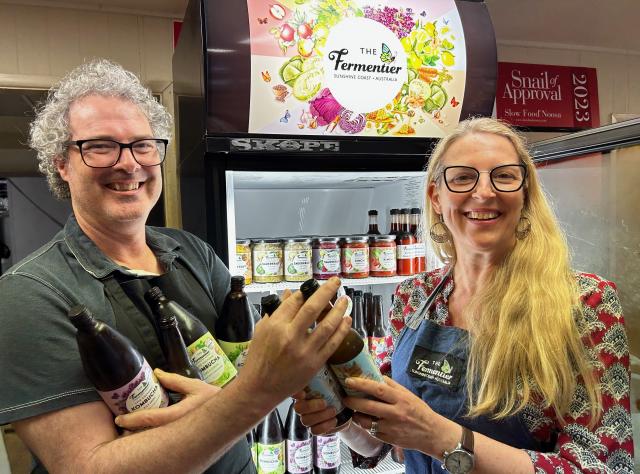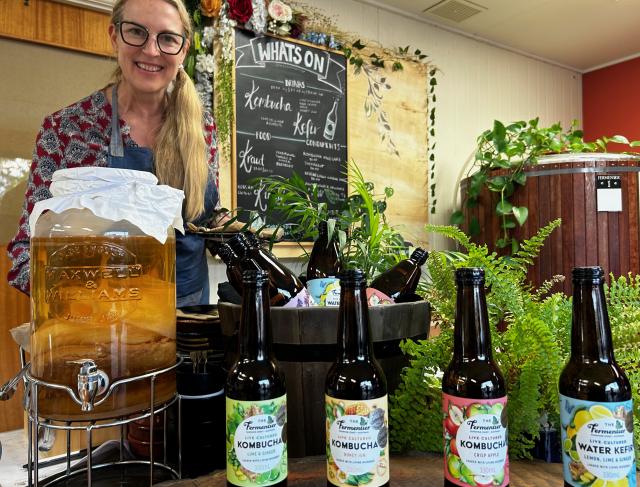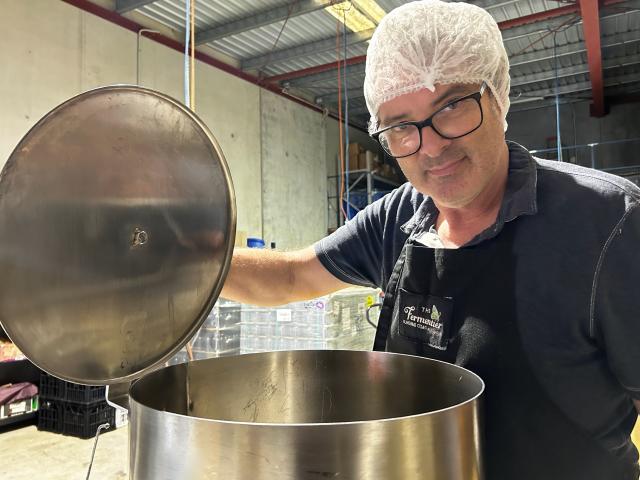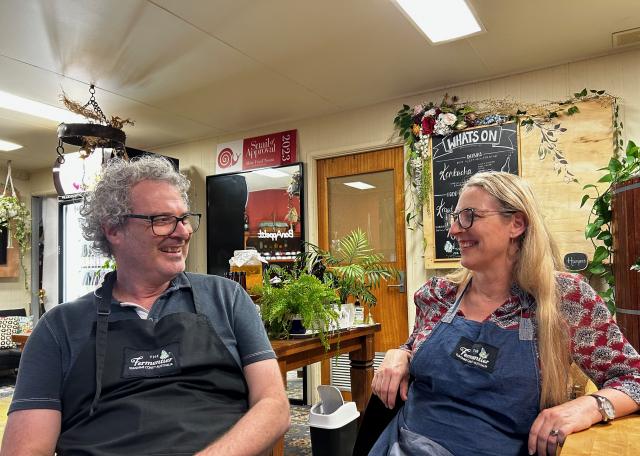PRECEDE
You can get a lot of satisfaction helping people. ERLE LEVEY talks to a couple who are doing just that through the healthy food and drinks they make.
BREAKOUT QUOTE
“It’s a whole new way of thinking, rather than having doctors tell you what to eat … it’s getting on a level understanding. People respect you more if you know about good food.“
A pain in the guts … how often have we heard that term in Australia?
The good news is that businesses such as those run by Tania Wiesmayr-Freeman and Andrew Freeman are producing food that not only tastes good but is good for us.
It’s no secret that many Australians’ struggle to maintain a healthy diet.
For Andrew and Tania at The Fermentier, their mission is to overcome this challenge with delicious, natural, living fermented food and drinks.
Sitting with them at their factory and retail outlet at Kunda Park, they tell me about their amazing journey – one that has taken them through several Australian states and territories as well as South Africa.
Their shop is a real surprise – a cafe set among warehouses and storage yards.
There, over a tasting table of kombucha, kimchi and sauerkraut, Tania tells me about her transition from nursing to dietician and food producer.
Born in Melbourne, Tania owes much of her entrepreneurial drive to her parents, who grew up during the Second World War.
Her father came to Australia from Austria in the 1950s – not by ship from Europe but by plane and he saw the ocean for the first time when they stopped in Darwin.
Austria is a land-locked country and he came from a farming community on the Danube River, near Linz.
Eferding is where they grow beautiful vegetables, and is the second oldest walled city in Austria.
Her father, Alfred, migrated as a single man, with six of his friends. They had a world map and had to decide between Canada and Australia.
“They walked away from any inheritance and made their way to Australia.
“They had a pledge and all met again years later. The six of them, in Melbourne.
“Eventually Dad went to Bonnegilla on the Victoria-New South Wales border.
“He thought he was in heaven because the amount of food on their plate was so much more than what they’d been used to during the war years in Europe.
“His eyes popped out of his head – he was given food, he could play football. They could look for jobs and swim in the Murray River.
“Straight away he went to night school. He was already a weaver and he could make linen.
“I still have some of the pieces that he made as well as his trade books.’’
Showing the drive that Tania would inherit, her father completed his Leaving Certificate.
During that time he made friends with another man at night school in Melbourne who had a sister. She was from the western suburb of Williamstown.
It was a housing commission area back then and Janet was one of seven children.
So Alfred Wiesmayr and Janet White were married.
“His grandparents had run a pub and I am brewing drinks now,’’ Tania laughs.
“Dad was a teetotaller and converted from Roman Catholic to Evangelical.
“They bought a five-acre property in Monbulk in the Dandenong Ranges. Lots of fruit trees but no money, so they did a lot of preserving of fruit and vegetables.
“Mum learned from cooking for the large family and that’s what started my interest.
“Dad became an analytical chemist and theological pastor.
“There were so many other European immigrants he would sponsor from the ships to get jobs.
“We would have big dinners and I would learn about food there.’’
Andrew, on the other hand, had quite a different family background.
McMillan is a traditional British family name and they came to Australia as shared farmers.
Tania’s mother had married an Austrian, her uncle had married a Spanish artist, another was awarded a Churchill fellowship for education.
It was a diverse family, very artistic and unusual for that time to have such a rich cultural background.
Andrew grew up in Warragul, a dairy farming region in Gippsland, Victoria.
His father was initially a teacher, but became an agricultural machinery engineer and used to design shearing sheds in line with the changes in the wool industry at that time.
The introduction of wide combs meant shearers could increase productivity and the design of sheds needed to keep pace.
He even wrote a book on them, and designed sheds for Dubai to make useful spaces in the desert.
Andrew’s holidays were always travelling around Australia or New Zealand looking at shearing sheds, whereas Tania spent her holidays in a laboratory with a petri dish.
“We met at a youth camp,’’ she said. “It was love at first sight, basically.
“Three days in and we knew.
“He was a carpenter. I was training to be a dietitian. We wanted to get married early, but in doing so we wanted to be able to live out each other’s dreams.
“I knew I wanted to go to Africa.
“He had never thought about Africa, but he knew that’s what he had to do to marry me.’’
Tania’s first job as a clinical dietitian was at the Royal Darwin Hospital and Andrew got work there as well.
The aim was to carry out a cross-cultural training course to enable them to go to Africa.
“My role was to tell people about the benefits of eating properly,’’ Tania said. “Especially people with heart problems.’’
Their intention was to go into the country areas of South Africa, up north close to Mozambique.
Tania had to do an internship to be registered there. It was at a township on the outskirts of Durban with a 900-bed hospital.
“I got paid a local wage and Andrew helped on the maintenance team,’’ Tania said.
It was a time shortly after Nelson Mandela had been released from prison for his anti-apartheid activism.
He had become president of the nation from 1994 to 1999.
They were turbulent times and the hospital Tania worked at was filled with political factions.
It was about this time that the white majority rule was starting to collapse so there was a lot of tension, not just between the African population and the white population, but within the tribes within the different ethnic groups in Africa itself.
“We’ve lived through some things,’’ Tania said. “The hospital was a melting pot … there were guards with AK-47s.
“It’s all an adventure though, all part of life.’’
While they had gone to Africa to fulfil Tania’s dream, things took a 180-degree turn.
Andrew became a professional sports photographer. It happened by chance when he met two Australian cricket commentators on the beach and they invited him to photograph a match.
He went on to cover the 1994 Rugby World Cup and got to hold the trophy which had been presented by Nelson Mandela.
Back in Australia, they went to Tasmania and were based in the Hobart suburb of Bellerive for cricket.
Andrew was in his element.
Then he got called as a freelancer by The Age newspaper in Melbourne about a situation in Port Arthur.
They had got word of Martin Bryant coming into the hospital.
Bryant is the convicted mass shooter who murdered 35 people and injured 23 others in the Port Arthur massacre.
Andrew didn’t realise it at the time but he had a world-wide exclusive photo of Bryant lifting his head from the stretcher.
Both Tania and Andrew are obviously up for adventure … always looking for something different.
They have different talents. He has gone from carpentry to photography to workplace health and safety, IT and data. Now he is operations manager at The Fermentier.
“He has now learnt what I know – but with big equipment,’’ Tania said. “He has taken it to the next stage.’’
Their partnership in life as well as business is somewhat like a meeting of the rivers.
“I’m learning the whole business side of things,’’ Andrew said.
“Tania’s father had that background, but my father was business minded – he knew accounting.’’
These were all steps on the journey to where they are now.
Tania’s father would study at night, work during the day in factories, then started his own laboratory.
He would test soil and water, go to agricultural shows. He would do work for dog food companies and for a fertiliser company.
“He could turn his hand to anything,’’ Tania said.
“I grew up in an entrepreneurial family – Mum would sell seconds from the dog food factory.
“She would go to the Dandenong Market and while there, she would buy cases of vegetables and fruit and make a year’s supply of jams and preserves in the Vacola preserving jars.
“I grew up with her, making do by cooking in bulk.’’
Meanwhile Andrew’s father was very risk-averse, staid, analytical, clever.
He was designing how shearing sheds could be better utilised, how to improve sheep behaviour so they could be processed quicker – how they could flow more naturally and with less stress.
Raised boards for the shearers meant better ergonomics.
At the same time he was trying to value-add for the farmers. There was no fee as they had already paid for it through the wool clip.
After Tasmania, Tania and Andrew moved back to Melbourne, which was where they had their children.
Perhaps their most dramatic life-changing moment came on a holiday to Hamilton Island.
“Just sitting there, with two kids, we wondered what are we doing in cold Melbourne?’’ Tania said.
“So I got a job at Hervey Bay hospital and stayed there for 17 years.
“Andrew worked his way up to occupational health and then IT at the hospital.
“I was in quality and safety. Then I went back to the more educational side of things.
“I would be an instant investigator when things went wrong – see what went wrong from our side of things, like a patient safety officer.’’
Tania’s passion for food flipped over at that stage, even though she didn’t know it.
The Fermentier story started when they moved to the Sunshine Coast and she started work at the university.
“They knew I was a clinical educator.
“When I started as a dietitian, you didn’t say that in a kitchen. Now it’s turning the tables and it’s an expectation.
“It’s a whole new way of thinking, rather than having doctors tell you what to eat … it’s getting on a level understanding.
“People respect you more if you know about good food.
“It’s a different relationship now – the people who come through the university for instance, the athletes, know so much about food and nutrition.
“There’s so many other things to be aware of – medication, treatments – the food side of Australia has changed.
“There is a new field called culinary nutrition that dietitians have adopted.
“We need whole foods, no matter what people produce in powders. You cannot replicate whole foods.’’
Tania and Andrew live on a suburban block that backs onto bushland so they have wildlife and rainforest walks.
It’s a good balance to her work in the laboratory and the factory.
At the university Tania met a teacher who reminded her to do things with her hands.
“I’ve always done that. I’ve done craft. I’ve done art.
“When I was making the kinaesthetics of squeezing kraut, just making things from food, I had an affinity with food because of my family in Austria and making sauerkraut – there are different sides to it.
“You can’t necessarily tell how it’s going to turn out … like sourdough in a way.
“People loved what I made and I would give it to them. And they would say they needed to pay for it but I would only rely on them putting money in an honesty box.
“The next step was crazy really. It’s not as if I had time, I’m still working at the uni, but I just couldn’t stop.
“We started The Fermentier for a good reason, not for any good business plan … it was passion and inner drive.
“I just had to do it.
“It’s weird how these things happen.
“Initially someone helped me for a start but then Andrew came on board.
“We have kept investing in the business – that has been for nearly five years.
“The product range has been kept pretty simple to start with, but there are some jams that are marketed at an outlet in Mountain Creek as well as the shop in Kunda Park.
“We are sold in shops from Noosa to Brisbane, in Gympie at outlets such as Farmer and Sun, some IGA shops and now in Bundaberg.’’
Joining Slow Food was a natural progression for the business as they have the same philosophies.
“I love the way they promote the need to maintain the diversity about food supplies, traditional foods,’’ Tania said.
“That’s so important because everything is getting funnelled down to fewer and fewer choices.
“Look for jams that are a little bit runny. Those that are firmly set are because it’s a commercial construct.’’
Well, that gives me a lot of heart with my Queensland plum jam that turned out as if I had to eat it with a spoon.
Apparently that’s the consistency you should be aiming for – to be served with a spoon onto the toast or the scones.
“Don’t worry about it,’’ Tania said. “You could write a whole book on the amount of practice needed.
“There’s a lot of science that goes into jam, how to get them to set … you won’t find them in books, there’s all sorts of ways.
“Slow Food was a natural link with us – the traditional food, the natural product. That sits with me as a dietitian, and the philosophy of sustainable, local and fair.’’
While sauerkraut has been around for thousands of years, Australia has missed out for many years on its benefits.
“We need to get these foods into our diet,’’ Tania said. “The reason is our food is too clean.
“Using pesticides on food kills the microbia on the outside.
“We need them. They are naturally on the outside skins of fruit and vegetables.
“We need to put that back in to help maintain you, to keep your gut flora in alignment.
“So many places in the world ferment food, so that it won’t go off – kombucha from Asia, lebnah, the strained yoghurt from Lebanon, sauerkraut from Europe, kimchi in Korea.
“There is lots of research behind it. Have fermented foods regularly as part of a healthy diet.’’
The story of The Fermentier is we have two people from different backgrounds combining for a new direction in life … both in their relationship and in business.
When asked if he knew what he was getting in for when he met Tania, Andrew said: “No … she was interesting, enticing.
“The commonality has been the enjoyment of adventure.’’
They want a simple life, Tania said. Not wealth and fame.
“We love helping people, we love meeting people. We are not career orientated – that’s been the bond, that’s kept it together.’’
Like in their personal lives, with The Fermentier they are bringing things from diverse backgrounds together, changing them.
They are brewing. They are fermenting.
Throw them together and you come up with a healthy relationship … it’s a healthy outlook, healthy balance, a healthy attitude.
“It’s the stories that we get from people that we really love,’’ Tania said.
“You get positive feedback from people. It’s amazing.
“Sitting around the table with the food, having a conversation, listening to the stories.
“It’s so funny because you’re enjoying it … vicariously you are helping people by having healthy food.
“They know that they should eat it and have it as part of their diet, not to treat it as medicinal for a short period of time.
“That’s why some people have such healthy lives. They don’t try it for a day, they have incorporated fermented foods into their life.’’
There’s a lesson there for all of us I think.










